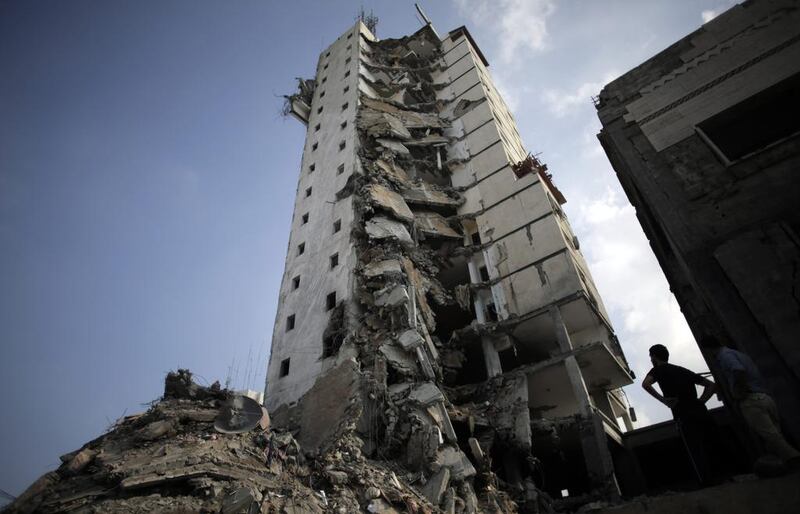GAZA CITY, Palestinian Territories // Israel ramped up pressure on Hamas on Tuesday, with warplanes hitting two Gaza City high-rises on day 50 of their conflict as the warring parties mulled a new Egyptian truce proposal.
There appeared to be little outward sign, however, of interest in the Egyptian proposal which seeks to broker a more permanent end to seven weeks of fighting in Gaza which has so far killed 2,336 Palestinians and 68 on the Israeli side.
Several back-to-back truce agreements which brought relief to millions earlier this month, collapsed in a storm of violence on August 19, with the renewed fighting killing another 115 Palestinians and an Israeli child.
Israel, which pulled its negotiating team out of the Cairo talks a week ago, has repeatedly said it would not negotiate under fire, conditioning a return to the table on a complete halt to cross-border rocket fire.
Although the Palestinians said they would be prepared to accept the new Egyptian offer, they would only do so after hearing Israel’s response to the proposal, a senior official said on Monday.
On the battlefront, Israeli warplanes kept up their pressure on Hamas with a series of air strikes on Gaza City, which killed two and wounded scores, witnesses said.
Emergency services spokesman Ashraf Al Qudra said an early strike killed two men in a street in the northern Al Nafaq neighbourhood.
Some time later, warplanes fired on a 16-storey mixed-use complex known as “Little Italy” in the northern Nasser neighbourhood, wounding 25 people, Mr Qudra said.
Witnesses said an F16 fired at least six rockets at the tower block, in which there were 60 apartments and a commercial complex including dozens of shops, completely destroying it.
One witness said residents had fled the building after the Israeli army sent them pre-recorded warning messages.
“The army told them to leave immediately and they all ran out into the street to find shelter,” he said.
Shortly afterwards, warplanes fired on the 14-storey Al Basha building in the western Rimal neighbourhood, causing massive damage and wounding another 15 people, witnesses said.
The Israeli army confirmed carrying out 15 air strikes overnight, among them buildings serving as Hamas “command and control centres”.
Warplanes also hit two schools in the central and northern Gaza from which “low-trajectory fire was directed at Israel”, it said.
Hamas’s armed wing, the Ezzedine Al Qassam Brigades, said it had fired missiles at Tel Aviv and the northern port city of Haifa in response, but the army said nothing had hit further north than Asheklon, where a rocket destroyed a house, lightly wounding 21 people.
Since midnight, 21 rockets have been fired at Israel, 18 of which struck the south and one of which was intercepted over greater Tel Aviv, a spokeswoman said.
"The goal of the fighting isn't to finish off every last launcher, the goal is to convince the other side to say 'enough'," a senior Israeli military official told Haaretz newspaper, adding that he believed Hamas was quite close to that point.
Political officials also believe most of the Islamist movement is looking for a quick end to the conflict, particularly after three of its senior military commanders were killed in a targeted assassination last week.
“The targeted killings have created a situation in the last week in which Hamas wants a ceasefire,” said science minister Yaakov Peri, an observer in the eight-member security cabinet.
“The man who is digging in his heels and who thinks he can get other achievements [through negotiations] is Khaled Meshaal,” he said, referring to the movement’s exiled leader who is based in Doha.
Although Israeli officials have refused to comment on the truce proposal, army radio said Israeli prime minister Benjamin Netanyahu had been locked in discussions late into the night with the defence minister and the chief of staff.
He did not hold consultations with ministers in his security cabinet, the radio said.
It indicated that the Egyptian proposal was for a month-long truce which would delay talks on weightier issues, such as an airport and sea port in Gaza, for another month.
A Palestinian official said on Monday that the proposal would involve the easing of restrictions at border crossings into the battered enclave and allow for the delivery of aid and reconstruction materials.
“The disputed points will be discussed in a month,” he said, adding such an agreement was acceptable to the Palestinians but they were waiting for Israel’s response.
Palestinian leader Mahmoud Abbas is expected to convene a meeting of the Palestinian leadership in the West Bank city of Ramallah on Thursday, a Palestinian official.
* Agence France-Presse





